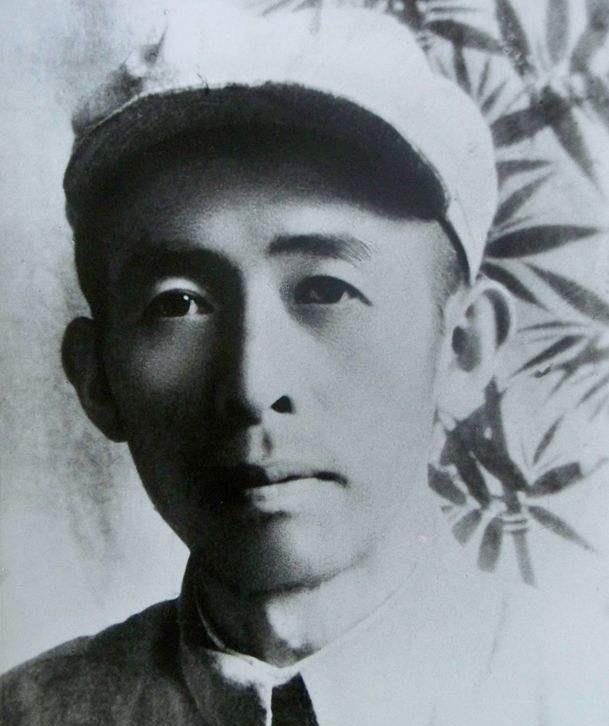He Zhenya is the founding major general.
On August 13, 1936, He Zhenya, then commander of the special task brigade of the Ankang Security Command in Shaanxi, announced the uprising and held the inaugural meeting of the 1st People's Anti-Japanese Army in southern Shaanxi at the compound of Liu Daqian's family in Zijing Township, Ankang County, officially becoming part of the Red Army.

In fact, this was the second uprising launched by General He Zhenya, as early as December 1935, He Zhenya also led his troops to launch an uprising, but was not allowed to join the Red Army.
He Zhenya is a native of Hanyin County, Shaanxi Province, born in 1913. At the age of 18, he entered the 17th Route Army Officer School of Yang Hucheng's department, and later participated in the cadre education class. In the cadre education class, he met Zhang Huimin, who had participated in the Ningdu Uprising.
Zhang Huimin, fearing that the purge would harm him, left the team and returned home in 1932, and later served as the leader of the education class in the cadre education class. Because he had served as a deputy division commander in the Red Army and had some understanding of the purpose of the Red Army, he often briefed he Zhenya and others who were ideologically progressive on our party's policy and the operational discipline and life of the Red Army, and played an enlightening role in He Zhenya and others embarking on the revolutionary road. (Zhang Huimin was posthumously awarded the rank of major general and revolutionary martyr in the Battle of Changde in 1943.) )
At this time, Mr. He was leading the Red 3rd Army through the east of Pingli into Hubei and Sichuan, which further aroused his strong desire to participate in the revolution, so before he finished his studies, he and several good comrades-in-arms privately set up the "Red Guard Regiment for Anti-Japanese Resistance and National Salvation in Southern Shaanxi" with the purpose of opposing Chiang Kai-shek (Jieshi), and after graduation, they joined the Red Army together.
In September 1934, He Zhenya and others were assigned to the 9th Company of the 4th Regiment of the 2nd Brigade of the Shaanxi Provincial Garrison as a platoon commander, and 3 months later, the Long March of the Red 25th Army arrived in southern Shaanxi and opened up the Eyu-Shaanxi base area, and the 4th Regiment of the 2nd Garrison Brigade, where He Zhenya belonged, was ordered to enter the Qinling Mountains to encircle and suppress the Red Army.
He thought, if you don't revolt and join the Red Army at this time, when will you stay?
Therefore, He Zhenya immediately contacted his comrades-in-arms who had wanted to join the Red Army together, and after dealing with the commander of the 9th Company, led more than 100 people in the whole company to declare an uprising in the Qinling Mountains in December 1935, preparing to defect to the Red 74th Division operating there.
The Red 74th Division was formed by the Shaanxi Southern Special Committee in the red 25th Army's evacuation of the Eyu-Shaanxi base area, and the various guerrilla divisions and guerrilla brigades in southern Shaanxi were formed, and was established in October 1935, with Chen Xianrui and Li Longgui serving as division commanders and political commissars respectively, which was a young revolutionary contingent.
After He Zhenya and others led the rebellion, they wanted to come to the Red 74th Division, but they were refused.
First, I just said that the Red 74th Division is a young contingent, and there is a relative shortage of political work cadres, and if it is incorporated, no one can be sent over.
Second, I don't know anything about He Zhenya and need to be observed for a while.
Therefore, the Red 74th Division suggested that He Zhenya and others should not first hang up the banner of the Red Army, temporarily carry out activities in the name of the guerrillas in southern Shaanxi, and then formally join the Red Army when the time is ripe.
Under such circumstances, He Zhenya and others were not discouraged, because joining the Red Army was his goal in life. Therefore, he followed the advice of the Red 74th Division and immediately announced the establishment of the "Southern Shaanxi Guerrilla Column" and personally took command. In the following combat life, they took the Red Army as an example everywhere and fought in Zhen'an, Zaoshui, Shiquan, Hanyin, Ankang, and Ningshan to fight the rich and help the poor, punish bullies, and carry out guerrilla activities, which was welcomed by the broad masses of the people.
Finally, on a certain day in June 1936, the liaison officer sent by our Northwest Special Branch, after some preparations, declared the second uprising on August 13, 1936, and established the 1st People's Anti-Japanese Army in southern Shaanxi, and participated in the battle together with the Red 74th Division.
After he formally joined the revolutionary ranks, He Zhenya successively served as the commander of the 1st Army of the People's Anti-Japanese Resistance in Southern Shaanxi, the head of the Guard Regiment of the Red 15th Army, the commander of the Guard Battalion of the 115th Division of the Eighth Route Army, the director of the Deputy Officers Division of the Xi'an Left Guard Regiment of the Eighth Route Army, the deputy chief of staff of the Third Column of the Northeast Military Region, and the chief of staff of the 40th Army of the Fourth Field Army, and was awarded the rank of major general in 1955. He died on 24 October 1978 at the age of 65.
More Exciting Articles:
The 16th Brigade of the New Fourth Army has four brigade commanders, who are they? Whose achievements did it later?
They were the political commissar of the leader of the Red 6 Regiment who outwitted Zunyi City, and the political commissar was later awarded the title of major general, what about the regimental commander?